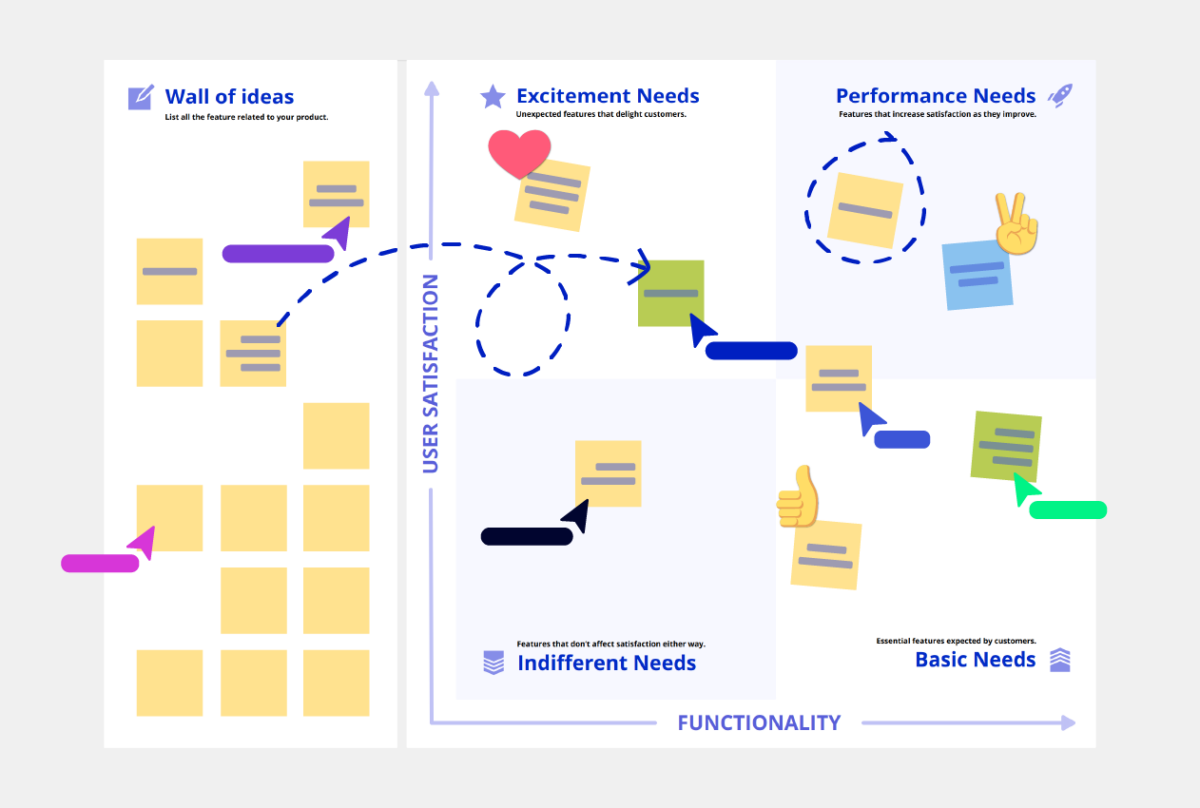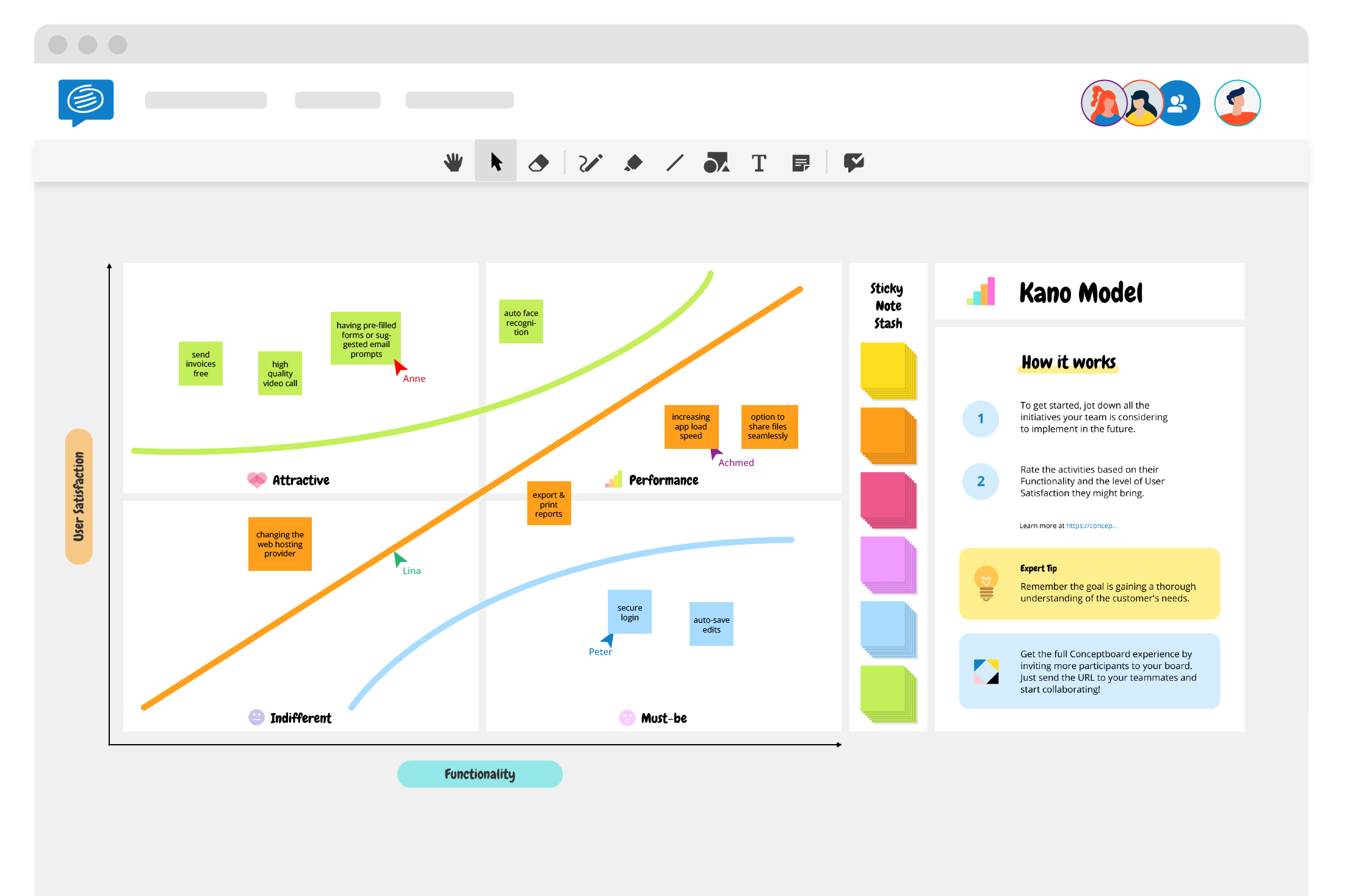Use the Kano model to prioritize a product roadmap
There are a number of prioritization models available (such as the Cost Benefit analysis or MoSCoW method), but where the Kano model differs is by focusing on user satisfaction above all.

Product teams have an endless product roadmap with feature requests from users, management, staff, and potential users. Deciding which features to work on first is a complex task, but thankfully there are tools to help. The Kano model is a template for product teams to strategically prioritize product features based on customer satisfaction.
In this comprehensive article, we cover the various elements of a Kano model and also provide a free template you can use collaboratively with your team.
Let’s dive into the different aspects of the Kano model.
What is a Kano model?
There are a number of prioritization models available (such as the Cost Benefit analysis or MoSCoW method), but where the Kano model differs is by focusing on user satisfaction above all.
It works on two sliding scales: how much satisfaction will this bring to our customers vs how it will improve functionality. By plotting features on this chart, product teams can visually see which features will have the greatest impact on satisfaction and functionality. At the same time, which features to avoid because they’re essentially a waste of time and resources that won’t deliver customer satisfaction.
Categories of a Kano model
The Kano model is dived into four quadrants, separated by two sliding scales: satisfaction and functionality. Move proposed features into one of the four quadrants: attractive, must-be, performance and indifference.
Attractive
These features are not expected and don’t directly improve performance, but they surprise and delight when they occur.
Example: having pre-filled forms or suggested email prompts
Performance
These features directly improve performance and functionality.
Example: increasing app load speed
Must-be
These features are expected, and without them, the product is simply incomplete.
Example: secure login
Indifferent
These features or functionality do not affect satisfaction at all and should not be prioritized.
Example: changing the web hosting provider
Kano model template
We’ve created a free online Kano model template on Conceptboard, so you can complete the analysis online with ease. Simply load the template and invite your colleagues to collaborate in real-time with you on the online whiteboard. Once you’ve finished, you can either save the template in your account, or download a PDF and share it with the wider team.

- Compile a list of features that are on the product roadmap.
- For each feature, you should Weigh them against two competing criteria: The potential to satisfy your customers vs functionality
- Step inside your customer’s shoes, so you can answer the following two questions from their perspective:
How do our customers they feel if they have the feature?
How do they feel if they did not have the feature? - Use these answers to move the features onto the model along the vertical axis
- Next, weigh each of these features against the improved functionality and move the features along the horizontal axis.
- Your completed model will show the features in the top right quadrant that will both improve functionality and deliver high satisfaction.
When to use a Kano model template
The Kano Model is used by product managers and UX designers who have limited time to implement features, and want to ensure they identify the appropriate mix of features to work on next. Its collaborative nature also helps design teams maintain focus when dealing with competing interests. Researchers may also find the Kano model helpful when surveying customers.
Importantly, the Kano Model predicts that all features will eventually turn from attractive to must-be’s over time. Consider free WiFi in hotel rooms. That would’ve been a delightful feature for guests a decade ago, whereas now it is completely standard and expected.
Example of Kano model for product design
We’ve created an example of what a Kano model template might look like in a product design team that’s building a new app.

In conclusion, it can seem like every feature on the roadmap is important, but knowing which ones will delight your customers is important when you have limited time and resources. By weighing up the most impressive features vs their functionality, you can prioritize features to create awesome products.
Continue the product design journey and explore our other popular product development templates such as the user persona, customer empathy map and customer journey map.
Give Conceptboard a try by signing up a for a free 30 day trial now.

